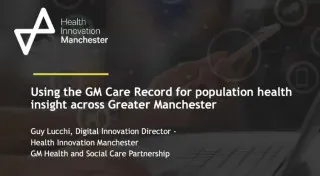The Greater Manchester Care Record story
30 July 2025
Health and social care organisations in Greater Manchester established the GM Care Record (GMCR), a shared care record that consolidates essential information for 2.8 million citizens. It is used monthly by over 10,500 health and social care professionals to support direct care across the region’s 10 localities.
Originally developed at speed during Greater Manchester’s response to the Covid-19 pandemic, the GMCR was a major programme delivered through a partnership between the GM Health and Social Care Partnership, the 10 GM localities, Health Innovation Manchester, and technology provider Graphnet. It has since become a core component of the region’s health and care delivery.
The GMCR continues to evolve to meet the changing needs of both citizens and the clinicians who serve them. Innovation is actively transforming care in Greater Manchester, as demonstrated by projects such as:
-
PACS Viewer Integration – transforming access to radiology across the region
-
Safety Medication Dashboard (SMASH) – providing digital tools to improve prescription safety and reduce patient risk
-
‘My GM’ Care App – empowering citizens and enhancing care through access to the GMCR

GM Care Record: Supporting the response to Covid-19
techUK webinar featuring presentations by Health Innovation Manchester and University of Manchester on the GMCR's benefits to care communities, research and public health management











